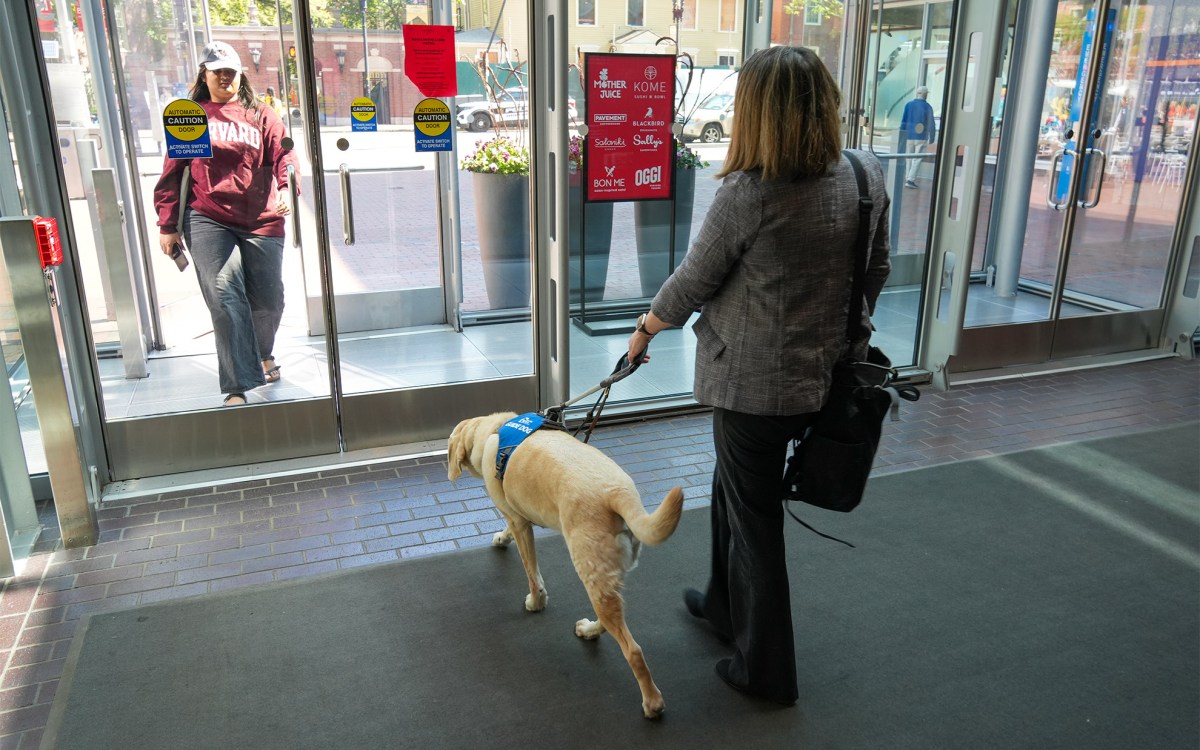Campus & Community
-

Kicking back with Rose Byrne
Australian actress feted, roasted as Hasty Pudding Woman of the Year
-

What’s the greatest love song of all time?
Faculty and administrators tell you theirs
-

Of different faiths, but connected by belief
Community members gather to explore identity, spiritual experience at first ‘Across This Table’ interfaith dinner
-

Batman returns — to accept his Pudding Pot
Michael Keaton feted as Hasty Pudding’s Man of the Year, 30 years after first invite
-

Funding innovative approaches to belonging
Supported by grants from the Culture Lab, four projects aim to strengthen belonging through listening, discussion, art, and representation
-

Class of 2001 elects Alejandra Casillas as chief marshal of alumni
Physician and health equity leader to serve in time-honored role
-
Staff satisfaction survey shows big gains
At Harvard, academic success is measured in many ways. We look at things such as admissions yield, research breakthroughs, alumni achievements, Rhodes scholarships, global name recognition, and yes, rankings in US News and World Report to tell us how were doing. But when it comes to measuring Harvard as an employer, the markers are less clear.
-
Physicist Costas D. Papaliolios dies at 71
Teaching fellow receives Rome Prize
-
2002 Harvard Board of Overseers and HAA Elected Directors are announced
The President of the Harvard Alumni Association announced the results of the annual election of new members of the Harvard Board of Overseers and the HAA Elected Directors.
-
Cooking up quite a story
Think about this the next time youre waiting for your burgers to cook on the grill: How was cooking invented? Today, all societies depend on cooked food, but when and how did cooking begin?
-
Education secretary touts public school reform
U.S. Secretary of Education Rod Paige told a Kennedy School conference on education and accountability Monday (June 10) that the Bush administrations reform program of testing, accountability, and school choice is a solution for American schools that are failing to educate a sizeable number of children
-
Erratum
In the degree chart on page 24 of last weeks Gazette, the figures for the Law Schools doctor of juridical science and doctor of law degrees should have been 546 and 8, respectively.
-
This month in Harvard History
June 1894 – The newly incorporated Radcliffe College holds its first Commencement in the auditorium of Fay House. At the request of President Elizabeth Cary Agassiz, the graduates wear pretty, simple dresses instead of caps and gowns, which Agassiz deems excessively masculine and potentially provocative.
-
Police Reports
Following are some of the incidents reported to the Harvard University Police Department (HUPD) for the week ending Saturday, June 8. The official log is located at 1033 Massachusetts Ave. (sixth floor).
-
Lewis A. Tyler, leader in international education
Lewis A. Tyler, a force for the advancement of Latin America and the Caribbean through international education, died May 30 in Boston.
-
-
Newsmakers
Teaching fellow receives Rome Prize
-
Tabla rasa
During a full-day colloquium on Teaching with the World Wide Web, Gina Siesing, senior specialist for instructional computing, Instructional Computing Group, discusses Designing Assignments for Curricular Change.
-
Crew clocks Yale at historic regatta
Harvards heavyweight crew completed the sweep against Yale this past Saturday (June 8) at the 150th anniversary of the Harvard-Yale Regatta, Americas oldest intercollegiate athletic event. The Crimson won the four-mile varsity race on the Thames River by 41.8 seconds, the largest margin in 27 years, with a time of 19:02.5. Yale finished at 19:43.8.
-
James Cuno ends 11-year tenure
James Cuno, director of the Harvard University Art Museums, has been appointed director of the Courtauld Institute of Art to lead its transformation into an independent college of the University of London.
-
Six new genes are linked to inherited breast cancer
A decade of research into one of the worlds least-known diseases has resulted in the discovery of six genes linked to inherited breast cancer.
-
Erik Erikson still has something to say
Erik Erikson, the psychologist who re-envisioned the human life cycle as a series of developmental stages, described the identity crisis, and popularized the genre of psychobiography with his books on Martin Luther and Mohandas Gandhi, would have been 100 years old on June 15.
-
Ante- and post-diluvian* days 1
From the front lines: Gazette reporters Ken Gewertz, Beth Potier, and Alvin Powell roamed through Commencement Day festivities, eyes, ears, and notebooks open. Some of their observations follow.
-
Ante- and post-diluvian* days 2
From the front lines: Gazette reporters Ken Gewertz, Beth Potier, and Alvin Powell roamed through Commencement Day festivities, eyes, ears, and notebooks open. Some of their observations follow.
-
Ante- and post-diluvian* days 3
From the front lines: Gazette reporters Ken Gewertz, Beth Potier, and Alvin Powell roamed through Commencement Day festivities, eyes, ears, and notebooks open. Some of their observations follow.
-
Ante- and post-diluvian* days 4
From the front lines: Gazette reporters Ken Gewertz, Beth Potier, and Alvin Powell roamed through Commencement Day festivities, eyes, ears, and notebooks open. Some of their observations follow.
-
Alford to direct Graduate Legal Studies at HLS
Law School Dean Robert C. Clark has announced that William Alford, the Henry L. Stimson Professor of Law, has been named director of Graduate and International Legal Studies at Harvard Law School. Alfords appointment will be effective July 1.
-
Two ‘scholars at risk’ fellows selected
President Lawrence H. Summers has announced that Harvard University is participating in the Scholars at Risk Network and has selected its first two visiting fellows, Mehrangiz Kar and Wolde Mesfin, for the academic year 2002-03.
-
Gene patterns reveal disease risks
A new discovery could make it much easier to find each person’s genetic risk of getting cancer, heart disease, Alzheimer’s, and other common diseases.
-
2002 Harvard Board of Overseers and HAA Elected Directors are announced
2002 Harvard Board of Overseers and HAA Elected Directors are announced
-
Harvard scientists contribute to National Academy terrorism report
Harvard scientists contribute to National Academy terrorism report
-
In jest and in earnest, President Summers bids graduates ‘Godspeed and veritas’
At his first-ever Baccalaureate address, Harvard President Lawrence H. Summers encouraged the Class of 2002 to develop their unique talents, contribute to their communities, and devote the coming years to nurturing the friendships that will sustain them into the future.
-
Twelve to receive honorary degrees
Nine men and three women will receive honorary degrees at Harvards 351st Commencement Exercises this morning, including the Hon. Daniel Patrick Moynihan, who will speak at the Commencement Afternoon Exercises.
-
Williamson is named Overseers’ president
Thomas S. Williamson Jr. 68, has been elected president of Harvards Board of Overseers for 2002-03. He will succeed Richard E. Oldenburg 54, after Commencement.
-
Memorial service set for Carolyn Andrews
A memorial service for Carolyn E. Andrews, who served as associate master of Leverett House from 1971 to 1981 with her husband, Kenneth R. Andrews, Donald K. David Professor of Business Administration Emeritus, will be held on Tuesday (June 11) at 2 p.m. in the Memorial Church.The service will be followed by a reception at the Harvard University Faculty Club.Mrs. Andrews died on March 20 at the age of 85.
-
Capping off a great year
Jesse Grunfeld, a Law School graduate, looks like hes about to give his mortarboard a sporty tilt as he gets his ensemble together for the great event. A slightly more solemn Ph.D. mannequin looks on.


